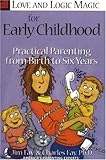 Love and Logic Magic for Early Childhood: Practical Parenting from Birth to Six Years by Jim Fay
Love and Logic Magic for Early Childhood: Practical Parenting from Birth to Six Years by Jim FayMy rating: 4 of 5 stars
This gave me some great and very practical ideas for dealing with the ups and downs of toddlerhood. Here are a few of my favorite points that I wanted to remember:
1. Ask questions to help the child solve problems. I should have done this today when Anna had a meltdown because she couldn't get her peaches to stay on her fork. Rather than jumping in and saying, "Let me cut those up for you," I could have said, "How do you think they'll stay on? Would smaller pieces work? Do you want to cut them or should I?" I did this successfully yesterday when Anna couldn't reach something on the counter. "How could we make it so you can reach that?" She thought for a while and said, "I could get a stool!" Me:"What could we use to be a stool?" Anna: "I have a big stool in the potty" Me: "Is there something in this room we could use as a stool?" Anna, after thinking and looking around: "I could use that chair for a stool!" Me: "Great job! You figured it out!"
2. Make the bad behavior the enemy, not you. "Uh oh, looks like the whiny voice is here again. I guess Anna has to go in her room until it's gone." Instead of, "I'm not going to listen to you when you're whining." I'm definitely still working on this one as it involves keeping my cool in the face of yet ANOTHER melting whining drama-filled disaster (like getting two feet in one pant leg)
3. Provide LOTS of empathy. Let love win out. Be sorry that they're not behaving, not angry. Show them that parenting them is a joy, not a chore. Remember that sometimes it's hard for ME to not get another cookie too, and tell them that.
4. Give choices ALL THE TIME, not just about clothes or food. This provides a sense of empowerment. "How do you want to make the bed? Fast or slow? Do you want to eat lunch before we leave? Or take it to the park? Which bench should we sit on? Should we sing this sing loud or quiet?" They suggest giving silly choices, like "Do you want to walk out of the store like lions or like kangaroos?" I've tried this a few times with Anna but she always responds, "No Mommy! I want to walk just like a girl!" So I tend to do more fast or slow, loud or quiet, silly or regular.
Another practical example I really love is "Do you want to pick up your toys now or in two minutes? I'll set the timer." I haven't done this yet, but they recommend the line, "You get to keep all the toys you put away. I get to keep all the toys I put away."
5. Validate your child's interests while reserving judgement, good or bad. Say, "You've been spending a lot of time taking care of that baby" or "I noticed you really like those blocks." This just lets your child know you see them and are paying attention without putting pressure on them.
They gave some suggestions that I haven't tried and am not too sure about. For example, they suggest that if your child is misbehaving, they "pay" you for the extra work you have to do because of it with toys. I don't think Anna would quite get this concept yet, and don't think she cares enough about any toy to really be upset if she were to part with it.
They also suggested encouraging your kid to yell or scream louder in the middle of a tantrum, saying, "Is that the best you can do? I've seen some better tantrums than that in my life." I really didn't like this suggestion but couldn't explain quite why, but then I read this in someone else's review, "I think telling our children to do something with the expectation that they do the opposite is never a good habit to start"
All in all, I'd highly recommend this book to parents of young children, even up to elementary school aged children. It's helped me stay calmer the past couple weeks and I think Anna has enjoyed some of the new things we've been trying.
View all my reviews
2 comments:
I took a love and logic class through the elementary school for $10 and seeing the principles visually helped me so much with the concepts. I use so many of their ideas every day! I could write a very long comment about the ones that work best at our house... enforceable statements, yes before no, lots of choices, energy draining technique, etc. The interesting thing about telling them to yell louder is that it turns their tantrum funny. It works better with Taylor than my others but she starts giggling pretty quick when I tell her to make surre she stomps as loud as she can when she's angry. The tantrum just disappears. Good luck! I love new tools that actually work.
I have heard so much about this book I should just make the time to read it. I too thought the yelling louder during a tantrum sounded like a bad idea, but reading Melanie's comment I guess I can see how it works...still don't think I'm brave enough to try that one though :-)!
Post a Comment